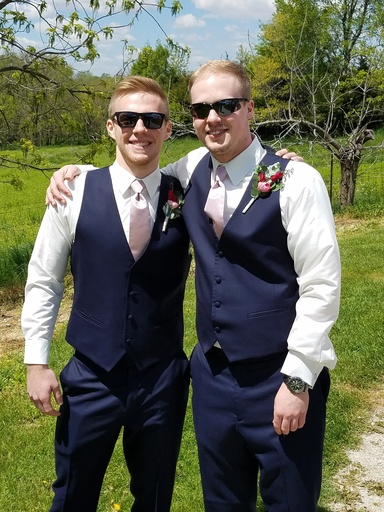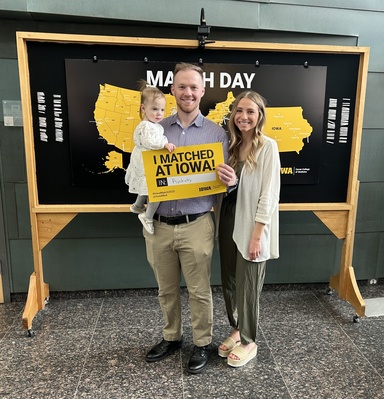Marshall Rupe (25MD) grew up outside of Mediapolis, Iowa, a small rural community in the southeast corner of the state. A first-generation four-year college graduate, he began to seriously consider a career in health care after shadowing an orthopedic surgeon from his hometown during a total hip replacement surgery.
“I got to see a doctor alleviate this guy's pain with his hands,” Rupe says. “I liked the idea that you could have a real, positive impact on people and how they felt.”
He entered medical school set on a career in orthopedic surgery. Then, at the end of his first year of medical school, his brother, Garrett, died suddenly at age 28.

“Garrett struggled with mental health for a long time, including substance use,” Rupe shares. “His death because of that left a lasting impact on me.”
Rupe moved back in with his parents and finished the semester virtually as the family grieved. He commends his course directors and the support of family and friends for his ability to finish school through this tough period.
The experience of his brother’s death made Rupe reflect on the community where he grew up. He had witnessed how a lack of access to and awareness about mental health care could isolate people who needed help. He started to reconsider whether orthopedic surgery was the right place for his skills and passions.
“I think I had mentally pigeonholed myself into surgery,” Rupe says. “But psychiatry was my favorite block that we studied out of everything in the preclinical years. The pathophysiology and the treatments were super interesting, and I liked the idea of being able to talk with people every day.”
Rupe began to consider that his family's experience and his rural upbringing could uniquely position him to be of service to rural Iowans in need of high-quality, compassionate mental health care.
“I think it's hard to understand what the culture is like unless you grow up with these people,” Rupe says. “Especially farmers and people in agriculture. There's a toughness about them that may cause them to not seek out care until things get really bad. I think it is easier to connect with people when you are familiar with what their life is like, and you know what their work is like. You just understand more of what they go through and what they value.”
He hopes that by returning to practice in a rural area, he can help lift the cultural stigma that can be associated with seeking mental health care.
“Growing up, there were a few kids in surrounding schools that died by suicide, and nobody talked about how they were feeling about it,” Rupe says. “Part of it is stigma, but there's also a shortage of mental health professionals all over the state.”
Volunteering with Free Mental Health Clinic in medical school helped Rupe gain some early experience with patient care. Medical students who volunteer with the clinic assist with interviewing patients under the supervision of resident physicians and advanced practice providers.
“The focus is on uninsured or underinsured patients that might not otherwise have access to that sort of care. That was a super rewarding thing for me,” he says.
Now in residency training, Rupe hopes to serve some of the most marginalized patients in psychiatric care, including those in acute crisis and inpatient settings. He discovered his passion for high-acuity psychiatry during medical school.

“Everything else we have done in core [clerkship] year, I kind of rolled out of bed thinking, 'OK, I’ve got to go in today.’ But for psychiatry, I was like, ‘I get to go in today.’ I get to talk with people and help. Inpatient care is an experience for patients that is often one of the most difficult points in their life. I think it's really cool to be able to make that easier for them.”
And now that he and his wife, Amanda, have started their family in Iowa, Rupe has more than one reason to put down roots in the state.
“We have such a strong support network here,” he says. “Iowa is a really good place to raise a family. I've seen the need in the state and the opportunity to make a big impact if I stay here. I like the idea of making a difference where I grew up, with the types of people that I grew up with.”